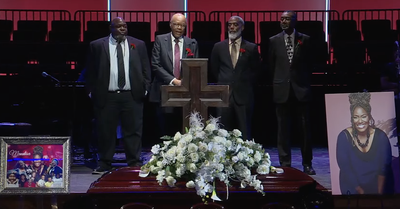
Inside the pages of the Bible are timeless truths for all of us — God created the world, we are all made in his image, he desires everyone to trust in him. God also asks us to care for children, especially those who are vulnerable and orphaned. No Christian would dispute this.
With March for Life occurring this month, children are on our minds a lot. Nearly 100,000 people are expected to travel to the National Mall to stand up for the pre-born. This number doesn’t even include all the local and state rallies that will be held throughout the country.
For millennia, those who follow Jesus have been a voice for the pre-born. Since the passing of Roe v. Wade in 1973, they have not only raised concerns and advocated for new laws, but they have also built pregnancy centers and family support systems.
In our efforts to fight for vulnerable children, we must continue to follow the broader call of Scripture — namely, to care for all children, pre-born and already-born.
We can begin by reminding ourselves that as Christians we have a responsibility to march for all life. In fact, this is an effort we’re already getting behind. The conclusion of a Lifeway Research survey on adoption and foster care was this: “Foster care appears to come naturally for churchgoers. It’s not surprising, since the Bible commands them to care for widows and orphans.”
Those who are vulnerable exist in the womb — but they also exist in places throughout our world where poverty, stigma, exploitation, and abuse occur. Broken systems have led to countless children being separated from their families and unnecessarily placed in orphanages and children’s homes.
Research has shown that 80 percent — 8 out of 10 — of the five million children worldwide who are living in orphanages or other residential care facilities have at least one living parent, most of whom could care for their children if they only had the means to do so. For those children whose parents aren’t able to care for them, the vast majority have other remaining family members who are willing to care for them.
Most children are in orphanages, not because they are orphans, but because their families are in poverty and struggling to care for them. Often the belief that an orphanage would take better care of their children, including accessing education, housing and food, has led families to relinquish their children to these facilities. Yet an orphanage can never fully meet a child’s needs. Children need family to provide them with the love, sense of belonging, and connection to community in order to thrive into adulthood.
But it doesn’t have to be either/or — either live with your family but suffer in poverty or have your physical needs met but live in an orphanage. It can be both/and.
An estimated $2.5 billion is given each year by U.S. Christians to orphanages, children's homes and other forms of residential care for children globally and in the U.S., but these resources can be redirected to serve a better purpose. They can support an effort to see all children raised in safe and loving families, where they can thrive.
Countless organizations around the world are finding ways to reunite children living in orphanages with their families, to keep the family unit together when they are struggling, and find new foster and adoptive families in-country for children when needed. These solutions provide a way for the children to have both their physical needs and their social and emotional needs met. My church has witnessed these solutions in action through our partnership with Make Your Mark in Ethiopia, an organization that focuses on reunification, family strengthening, and keeping children off the streets of Addis Ababa.
By shifting our giving to family-based care, U.S. Christians can play a leading role in helping the more than five million children who are currently living in residential care facilities and many more millions who are in vulnerable families or on the streets. We can also educate our local communities and churches about the importance of orphan care reform.
If the Bible is clear on the command to care for children, the vulnerable, and the orphaned, then we can be confident that there are countless ways we can do so. As American Christians, we must advocate for the unborn and the already-born too. Coming alongside all vulnerable children, including orphaned children who can be reunited with their families, is not someone else’s job. All of us have a role to play in improving the lives of these children.
This is what it looks like to be truly pro-life.
The views expressed in this commentary do not necessarily reflect the views of Christian Headlines.
Photo courtesy: ©Getty Images/Fizkes
Makenzie Magnus is Director of Missions at Council Road Baptist.










